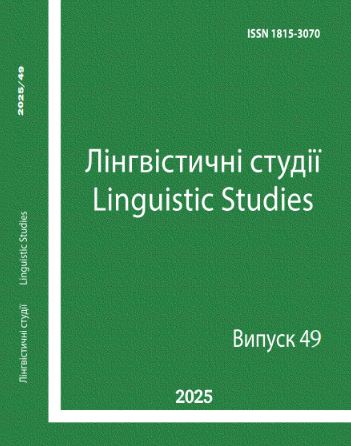Agreement and self-praise in response to manipulative complimentary utterances
DOI:
https://doi.org/10.31558/1815-3070.2025.49.7Klíčová slova:
manipulative positive strategy, verbal reaction to a manipulative complimentary utterance, Ukrainian language, evaluation, category of evaluation, agreement, self-praiseAbstrakt
The article describes the means of verbalising a reaction to manipulative praise in the Ukrainian language, which take the form of agreement and self-praise. Taking into account extralinguistic factors, the reasons for such a reaction to manipulative compliments are explained, its direct and indirect ways are outlined. Typical communication techniques used to increase influence on the interlocutor are identified. The relationship between the reaction to a manipulative compliment and the type of communication situation is revealed.
Reference
Бєлова, А. Д. Лінгвістичні аспекти аргументації (на матеріалі сучасної англійської мови) : автореф. дис. …д-ра філол. наук, спеціальність 10.02.04. Київ, 1998. 30 с. [Byelova, Alla. (1998). Linhvistychni aspekty arhumentatsiyi (na materiali suchasnoyi anhliysʼkoyi movy) [Linguistic Aspects of Argumentation (Based on Contemporary English)] : Diss. Kyiv. Abstract. (in Ukr.).]
Бобошко, Т. М. Комунікативні стратегії й тактики та оцінні висловлення. Лінгвістика ХХІ ст. 2013. С. 51–58. [Boboshko, Tetyana. (2013). Komunikatyvni stratehiyi y taktyky ta otsinni vyslovlennya [Communicative strategies and tactics and evaluative statements]. In : Linhvistyka ХХІ st. [Linguistics of the XXI century]. 51–58 (in Ukr.).]
Кононенко, В. І. Мова. Культура. Стиль : зб. статей. Київ-Івано-франківськ : Плай, 2002. 460 с. [Kononenko, Vitaliy. (2002). Mova. Kulʼtura. Stylʼ [Language. Culture. Style.]. Kyiv-Ivanofrankivsʼk : Play. (in Ukr.).]
Космеда, Т. А., Осіпова, Т. Ф. Комунікативний кодекс українців у пареміях : тлумачний словник нового типу. Дрогобич : Коло, 2010. 272 с. [Kosmeda, Tetyana, and Osipova, Tetyana. (2010). Komunikatyvnyy kodeks ukrayintsiv u paremiyakh : tlumachnyy slovnyk novoho typu [Communicative Code of Ukrainians in Proverbs: A New Type of Explanatory Dictionary]. Drohobych : Kolo, 272 (in Ukr.).]
Міщенко, В. Я. Комплімент в мовленнєвій поведінці представників англомовних (британської та американської) культур : автореф. дис. на здобуття наук. ступеня канд. філол. наук : спец. 10.02.04 «Германські мови». Харків : ХНУ ім. В.Н. Каразіна, 2000. 18 с. [Mishchenko, Viktoriya. (2000). Kompliment v movlennyeviy povedintsi predstavnykiv anhlomovnykh (brytansʼkoyi ta amerykansʼkoyi) kulʼtur [Compliment in the speech behavior of representatives of English-speaking (British and American) cultures] : Diss. Kharkiv : KhNU im. V.N. Karazina. Abstract. (in Ukr.).]
Мозгунов, В. Вихваляння як акт персвазії. Функціонально-комунікативні аспекти граматики і тексту : зб. наук. праць, присвячений ювілею д-ра філол. наук, проф., академіка АН ВШ України, зав. кафедри укр. мови ДонНУ Загнітка А. П. Донецьк : ДонНУ, 2004. С. 300–305. [Mozhunov, Volodymyr. (2004). Vykhvalyannya yak akt persvaziyi [Complimenting as an Act of Persuasion]. In : Funktsionalʼno-komunikatyvni aspekty hramatyky i tekstu [Functional and communicative aspects of grammar and text]. Donetsʼk : DonNU, 300–305. (in Ukr.).]
Сапрыгина, Н. В. Психолингвистика диалога. Одесса : Изд-во «ТЭС», 2003. 328 с. [Sapryhyna, N.V. (2003). Psykholynhvystyka dyaloha [Psycholinguistics of dialogue]. Odesa : Yzd-vo «TES» (in Ukr.).]
Селиванова, Е. А. Основы лингвистической теории текста и коммуникации. Киев : Брама, 2004. 336 с. [Selyvanova, Elena. (2004). Osnovy lynhvystycheskoy teoryy teksta y kommunykatsyy [Fundamentals of Linguistic Theory of Text and Communication]. Kyіv : Brama (in Ukr.).]
Сліпецька, В. Взаємозвʼязок понять емоційність, оцінка, експресивність – актуальна проблема лінгвістичної теорії емоцій. Studia Ukrainica Posnaniensia. 2016. Vol. IV. С. 149–153. [Slipetsʼka, Vira. (2016). Vzayemozv"yazok ponyatʼ emotsiynistʼ, otsinka, ekspresyvnistʼ – aktualʼna problema linhvistychnoyi teoriyi emotsiy [The relationship between the concepts of emotionality, evaluation, expressiveness is a relevant issue in the linguistic theory of emotions]. In : Studia Ukrainica Posnaniensia. Vol. IV, 149–153 (in Ukr.).]
Шкіцька, І. Маніпулятивні тактики позитиву : лінгвістичний аспект : монографія. Київ : Вид. дім Дмитра Бураго, 2012. 440 с. [Shkitsʼka, Iryna. (2012). Manipulyatyvni taktyky pozytyvu : linhvistychnyy aspekt [Manipulative positive tactics : linguistic aspect]. Kyiv : Vyd. dim Dmytra Buraho (in Ukr.).]
Яшенкова, О. В. Основи теорії мовної комунікації. Київ : Академія, 2011. 304 с. [Yashenkova, Olha. (2011). Osnovy teoriyi movnoyi komunikatsiyi [Fundamentals of Language Communication Theory]. Kyiv : Akademiya (in Ukr.).]
Chen, R. (1993). Responding to compliments. A contrastive study of politeness strategies between American English and Chinese speakers. Journal of Pragmatics, № 20, 49–73.
Frankowska, V. (2010). O strategiach grzecznościowych polskich i niemieckich studentów na przykładzie reakcji na komplementy. Investigationes Linguisticae, № 19. 31–52.
Frankowska, V. (2013). Specyfika językowych zachowań kobiet i mężczyzn w reagowaniu na komplementy. Porównanie polsko-niemieckie (Gender differences in verbal responding to compliments. A polish-german comparison). Wydział Neofilologii : Instytut Filologii Germańskiej. URL https://repozytorium.amu.edu.pl/items/12f325cc-e26d-472f-9569-a49d598b3d2a
Herbert, R.K., Straight, H.S. (1989). Compliment – Rejection Versus Compliment. – Avoidance: Listener-Based Versus Speaker-Based Pragmatic Strategies. Language and Communication, Vol. 9. № 1. 35–47.
Lewandowska-Tomaszczyk, B. (1989). Praising and Complimenting. Oleksy W. (ed.) Contrastive Pragmatics. Amsterdam : John Benjamins Publishing Company, 73–100.
Nicolaysen, S. (2007). Kompliment als Hoflichkeitsstrategie. Ein Vergleich am Beispiel des Schwedischen und des amerikanischen Englischen. Saarbrucken : YDM Yerlag Dr. Muller, 136.
Pomerantz, A. (1978). Compliment Responses : Notes on the Co-Operation of Multiple Constrains. J. Schenkein (Ed.). Studies in the Organization of Conversational Interaction. New York: Academic Press, 79–112. URL https://doi.org/10.1016/B978-0-12-623550-0.50010-0


